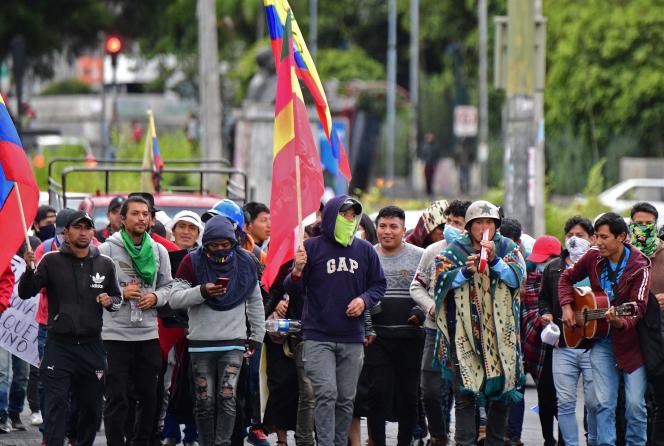Ecuadorian President Guillermo Lasso announced on Sunday June 26 a drop in fuel prices, in a proportion nevertheless lower than the demands of the thousands of natives who have been demonstrating and blocking part of the country for two weeks. “I have decided to reduce the price of gasoline by 10 cents (of dollars) per gallon (3.78 liters) and the price of diesel also by 10 cents per gallon,” the Ecuadorian president said in a radio and television address. .
This reduction will bring the price of diesel to 1.80 dollars, and that of gasoline to 2.45 dollars, while the powerful confederation of indigenous nationalities (Conaie), spearhead of the demonstrations, demanded a drop in the price of fuels at 1.50 and 2.10 dollars. In less than a year, diesel is up 90% (to $1.90) and gasoline 46% (to $2.55).
“Ecuadorians who seek dialogue will find a government with an outstretched hand. Those who seek chaos, violence and terrorism will find the full force of the law,” assured President Lasso, who spoke hours after the resumption in Parliament of a debate on his possible impeachment. A majority of 92 votes out of 137 is necessary for the impeachment procedure to be adopted, while the opposition is in the majority but divided within the Assembly.
Oil production coming to a halt
Since the protests began on June 13, the violence has left at least five people dead and dozens injured. Quito is largely paralyzed and its access blocked by numerous roadblocks. The demonstrators tried twice, Thursday and Friday, to enter the National Assembly compound, from where they were repelled by the police.
Roadblocks and blockades continue in 19 of the country’s 24 provinces. Shortages are already being reported in Quito, where prices have soared and many markets remain closed.
Meanwhile, oil production in Ecuador is at a “critical level” and will cease within 48 hours if protests and blockades continue, the energy ministry said on Sunday, referring to production already reduced today. 50% of normal. “(…) Vandalism, seizure of wells and road closures prevented the transportation of supplies and diesel necessary to maintain operations,” according to the ministry. Oil, extracted in the Amazon provinces, is the country’s main export product.

















